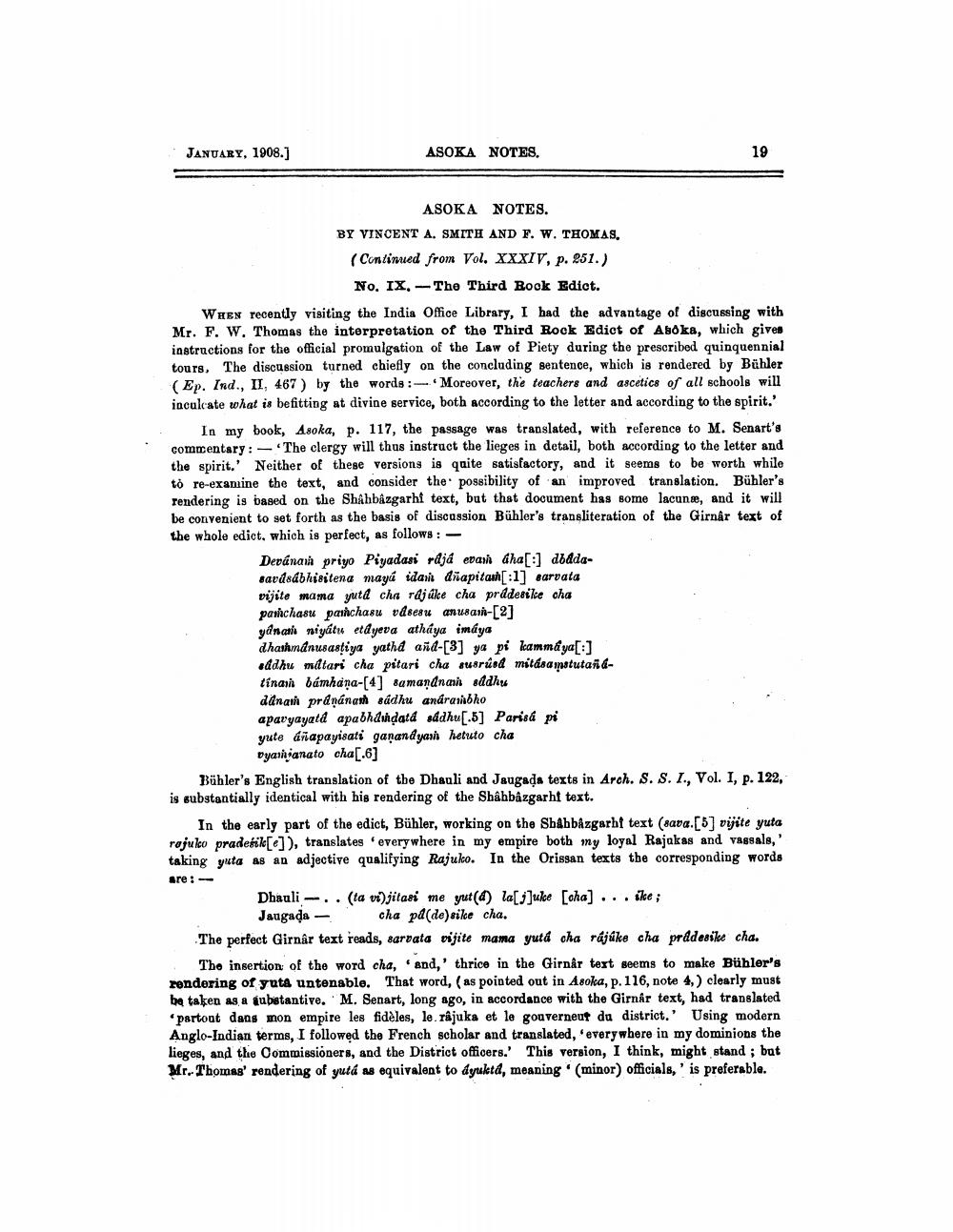________________
JANUARY, 1908.]
ASOKA NOTES
19
ASOKA NOTES. BY VINCENT A. SMITH AND F. W. THOMAS
(Continued from Vol. XXXIV, p. 851.)
No. IX. --The Third Rock Edict. WHEN recently visiting the India Office Library, I had the advantage of discussing with Mr. F. W. Thomas the interpretation of the Third Rock Edict of Asoka, which gives instructions for the official promulgation of the Law of Piety during the prescribed quinquennial tours. The discussion turned chiefly on the concluding sentence, which is rendered by Bühler (Ep. Ind., II, 467) by the words : - Moreover, the teachers and ascetics of all schools will inculcate what is befitting at divine service, both according to the letter and according to the spirit.'
In my book, Asoka, p. 117, the passage was translated, with reference to M. Senart's commentary: - The clergy will thus instruct the lieges in detail, both according to the letter and the spirit.' Neither of these versions is quite satisfactory, and it seems to be worth while to re-examine the text, and consider the possibility of an improved translation. Bühler's Tendering is based on the Shahbazgarhi text, but that document has some lacunse, and it will be convenient to set forth as the basis of discussion Bühler's transliteration of the Girnar text of the whole edict, which is perfect, as follows:
Devânarh priyo Piyadasi rdjá evasi Ghar :) doddasavdodbhisitena mayá idant diapitan[:1] sarvata vijite mama yuta cha rdjúke cha prddesike cha pashchasu panchasu vasesu anusarn-[2] yanais niyátu etdyeva athaya imaya dhashmanusastiya yatha aña-[3] ya pi kammaya[:] oddhu matari cha pitari cha suerúod mitdramatutaidtinan bámhana-[4] samandnan sddhu danai pránanan sádku anáraibho apavyayatd apabhanhdata sidhu[.5] Parisá pi yutе áriapayisati ganandyas hetuto cha
vyanjanato cha[.6] Bühler's English translation of the Dhauli and Jaugads texts in Arch. S. S.I., Vol. I, p. 122, is substantially identical with his rendering of the Shahbâzgarht text.
In the early part of the edict, Bühler, working on the Shahbâzgarht text (sava.[5] vijite yuta rajuko pradetik[@]), translates everywhere in my empire both my loyal Rajakas and vagsals,' taking yuta as an adjective qualifying Rajuko. In the Orissan texts the corresponding words are: -
Dhauli -.. (ta vijitasi me yut(a) la[j]uke (oha) ... se;
Jangada cha pd(de)sike cha. The perfect Girnar text reads, sarvata vijite mama yuta cha rájúke cha prddesike cha.
The insertion of the word cha, end,' thrice in the Girnår text seems to make Bühler's rendering of yuta untenable. That word, (as pointed out in Asoka, p. 116, note 4,) clearly must be taken as a substantive. M. Senart, long ago, in accordance with the Girnar text, had translated
partout dans mon empire les fidèles, le râjuka et le gouverneut da district.' Using modern Anglo-Indian terms, I followed the French scholar and translated, everywhere in my dominions the lieges, and the Commissioners, and the District officers. This version, I think, might stand ; but Mr. Thomas' rendering of yutá as equivalent to yıktd, meaning (minor) officials,' is preferable.




